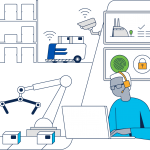2021: The New Normal
I think the biggest question we’ve all had since the onset of this pandemic has been: when will this end? As it became clearer over time that this wasn’t going to just go away as many of us had hoped, the question became: what comes next?
As vaccines continue to be administered to millions around the world, the answer to that question is starting to take shape. While we can never go back to our pre-COVID world, we can and will achieve some semblance of “normal.”
What does that look like in manufacturing? An explosion of connectivity to put it mildly. The trends we’ve been seeing for years, that many were admittedly slow to adopt (automation, digitization/IoT, influx of data) have taken off on a rocket ship since the pandemic hit. The idea of a factory running entirely on its own with dispersed teams and remote experts running the show a few years ago was just that: an idea. Now, this has become the new normal for many.
Onwards and upwards
So, those are all great buzzwords, but what does any of it mean? Glad you asked! The ARC Advisory Group has come out with a deep dive on five trends they’re betting on this year. Let’s take a look:
- Technology Convergence Morphing into Technology Fusion
Cloud. The edge. Data. Security. We have a tendency to talk about these subjects as separate entities rather than intricate pieces of a larger, complicated puzzle. ARC thinks that’s going to change, and I don’t disagree. There’s a lot to gain by looking at the bigger picture. You can miss a lot if you’re too zoomed in on the individual parts.
- Operational Resilience Becoming a Key Objective
Although this trend may seem to arise strictly from the pandemic, that’s a bit of a misnomer. Operations have been facing increasing risk over the past several years by way of commodity instability (read: trade wars), cybersecurity threats, and new regulations (many arising from sustainability and climate pressures from around the world). Supply chain is another big complication. Thanks to the likes of Amazon, we have created some of the most complex, efficient supply chains this world has ever seen. Forgot to get dog food at the store? No problem! Order it now and you can get it at your door in a few hours. While this is almost too convenient, it’s not without its costs. When China shut down from the pandemic, supply chains around the world faced months of delays. This (among other factors) has led many to start re-shoring operations to mitigate future risk. - Remote Operations Becoming the New Normal
This one is not a shocker. To avoid sounding like a broken record, I’ll just say see previous 10 months/global COVID-19 case count for reference.
- Automated Operations Becoming Autonomous Operations
When you automate enough processes, eventually they become smart enough to run on their own (basically). No, I’m not saying the machines are going to take over, but this does mean that workers will have more time to spend adding more value to these processes rather than only being able to focus that Widget A becomes Widget B. - Edge Computing Platforms Becoming Edge Automation Platforms
Ahh, and we’re back to automation once again. (insert Marcia, Marcia, Marcia gif here) What does it mean in terms of the Edge? Quite simply, it will run itself, meaning, data, and more importantly, the operations that depend on it, won’t rely solely on the IT guy.
Want to read more?
Great! You can read the full article from ARC Advisory Group here.
Coming up…
As previously stated, more to follow on these trends. Stay tuned for upcoming 2021 Trends deep dive podcast episodes on sustainability, data, automation, and security.
Until then, take a listen to Part 1 of the 2021 Trends Podcast Series.

CONNECT WITH US